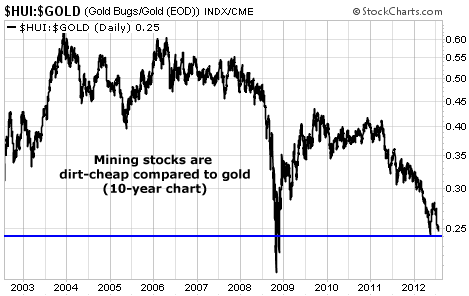| Home | About Us | Resources | Archive | Free Reports | Market Window |
The Most Important Question Every Investor Has to AskBy
Wednesday, July 25, 2012
I want you to stop right now and ask yourself what a stock is...
It's a piece of a business. When you're a shareholder, you own "equity" in a business.
What does that mean? Well, it means you're just not that important. It means you're going to have a really hard time making money... unless you understand one incredibly important thing about the "equity" you own...
First, let's talk about why you don't really matter...
For starters, you're an outsider. Sure, the stock you buy means you own a piece of the company. But let's be realistic. You have no idea what's going on in its hallways, meeting rooms, and corner offices minute by minute, day by day. Management could be swinging from the chandeliers. (How do you know there aren't any chandeliers?)
Not only are you an outsider, but you're passive, too. You get to vote your shares, but otherwise, management doesn't want to know and certainly doesn't really care what you think. In management's view, you, the shareholder, are best neither seen nor heard.
And while you may have the potential to vote with the majority, wielding whatever power you possess, you are the tiniest minority of all: the individual shareholder. You are a gnat on the windshield of the companies in your portfolio.
So what does your "equity" get you?
"Equity" is a residual claim on the assets and earnings of a business. The word "residual" is really important. It means equity holders – shareholders... you – get whatever is left over only after everybody else gets paid.
Only after all the expenses of the business are paid – all the executive salaries and bonuses, all the utility bills, employee wages and benefits, interest, taxes... everything – does the equity holder get anything.
So... what you really want when you own equity, what you need as a shareholder, is a company that has a lot of cash left over after it's paid everybody else.
Take Microsoft, for example. After paying all the bills and reinvesting in the business during the first nine months of fiscal 2012 (ended June 30, 2012), Microsoft generated more than $22.2 billion in free cash flow. THAT's what I mean by having lots of cash left over after paying everybody else.
Public companies have to report how many times over their earnings cover their interest and other fixed charges, like leases. Last year, Microsoft covered its fixed charges 81 times over. THAT's what I mean by having lots of cash left over after paying everybody else.
Microsoft has nearly $60 billion in cash and investments on its balance sheet. THAT's what I mean by having lots of cash left over after paying everybody else.
And THAT's how you can make money even though you're an outside, passive, minority investor.
If you want to know how to get a quick read on whether a company generates more cash than it needs, just go to its cash flow statement. Subtract "additions to property and equipment" from "operating cash flow." (Sometimes that first number will simply be called "capital expenditures.")
The resulting number is called "free cash flow." In many cases, free cash flow won't even be a positive number. In most other cases, it'll be pretty small. In Microsoft's case, it's huge.
If you're holding equity in a business that doesn't generate lots of free cash flow, you have some thinking to do. At least be honest enough to admit you're not investing. You're speculating.
Equity without free cash flow is little more than a bet that the assets will be worth more in a liquidation than what you paid. Maybe it's a bet the business will one day generate a cash profit. Either way, it's more a statement of hope than one of understanding.
A lot of people buy equities without having any clue of what it means to be an equity owner. Now that you know what it means... what are you going to do about it? Are you going to make darn sure the businesses you invest in are generating lots of free cash flow after they've paid everybody else?
Good investing,
Dan Ferris
Further Reading:
Over the last year, Dan has shared the financial clues of a blue-chip, World-Dominating business... explained why these "boring" businesses are more profitable than "exciting" ones... and shown how to take advantage of their extraordinary income streams that always go up.
He's not alone in recommending these high-quality companies. Back in February, Doc Eifrig showed DailyWealth readers how to use them to safely generate 10%-20% annual returns. Get the details here: Before You Buy Another CD or Bond, Make Sure to Read This.
Market NotesGOLD STOCKS ARE CHEAP AGAIN There's no question: gold stocks are cheap.
Regular readers know gold stocks have been cheap relative to the price of gold for some time. But now, gold stock valuations are back to the absurd levels they hit just a couple months ago – right before the sector rallied 20% in two weeks.
As the chart below shows, with the exception of the massive selloff during the financial panic in 2008, the sector is now cheaper – relative to the gold price – than it has been at any time since the gold bull market began more than a decade ago.
The chart is back down to where it was in May… And that's a good thing. This "retest of the lows" on this chart gives investors another chance to start buying into the sector at decade-low valuations.
– Jeff Clark
 |
In The Daily Crux
Recent Articles
|


